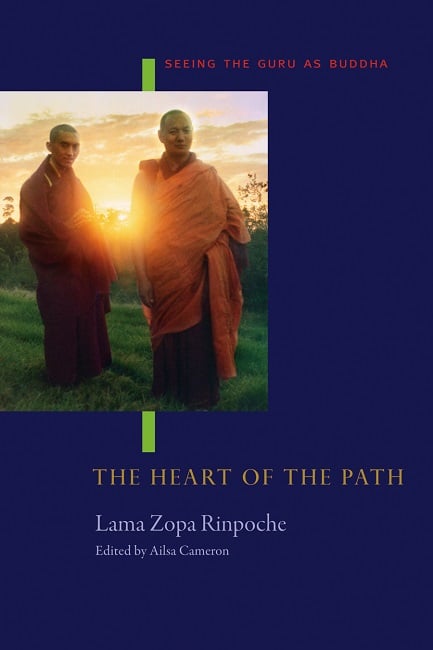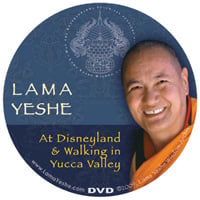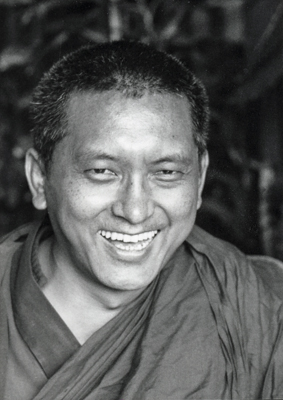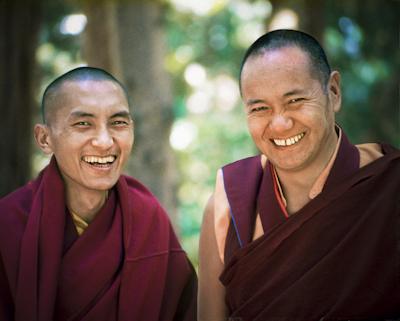Dear LYWA Friends and Supporters,
Thank you for your kind interest in the Archive.
New LYWA Publications Our new book, Lama Zopa Rinpoche’s The Heart of the Path, is becoming a resounding success. We’re in the process of sending copies to all our members. If you’re in Europe they’re being sent by Wisdom Books; in Singapore and Malaysia they're being sent by our office in Singapore. Members in Australia will be getting their books from Mandala Books, after they arrive in mid-June. Everyone else should have received their copy from our office here in Lincoln.
Our new book, Lama Zopa Rinpoche’s The Heart of the Path, is becoming a resounding success. We’re in the process of sending copies to all our members. If you’re in Europe they’re being sent by Wisdom Books; in Singapore and Malaysia they're being sent by our office in Singapore. Members in Australia will be getting their books from Mandala Books, after they arrive in mid-June. Everyone else should have received their copy from our office here in Lincoln.
If you are not a member, please consider joining up—members automatically get all new Lama Yeshe or Lama Zopa Rinpoche books published by Lama Yeshe Wisdom Archive or Wisdom Publications. If you cannot become a member at this time, please do yourself a favor and buy this book. 512 pages, $20 plus S&H, for this precious compilation of Rinpoche's teachings.
What's New on the Web
We have just posted the audio recordings of Lama Zopa Rinpoche's Kadampa Teachings at Root Institute, Bodhgaya, in 2003. This was an extensive series given over 7 days which included an oral transmission and commentary of Atisha's Jewel Garland. As usual, you can follow along with an unedited transcript as you listen online.
We have also posted two short advices from Rinpoche on the recitation of certain mantras: The Benefits of the Heart of Amogapasha Mantra and The Benefits of the Clouds of Offering Mantra.
For those of you enjoying Amazon's Kindle reader, we wanted to let you know that we currently have three of our titles available for Kindle: Lama Zopa Rinpoche's Making Life Meaningful and Lama Yeshe's Universal Love and The Essence of Tibetan Buddhism. We will eventually have all of our titles posted.
New and Forthcoming DVDs We have a new DVD, a couple of short 1977 films: Lama Yeshe at Disneyland and Walking in Yucca Valley. You can view both films in their entirety on our website (about 16 minutes in all) or you can order a copy for $5 and we'll send it to you with no shipping charges.
We have a new DVD, a couple of short 1977 films: Lama Yeshe at Disneyland and Walking in Yucca Valley. You can view both films in their entirety on our website (about 16 minutes in all) or you can order a copy for $5 and we'll send it to you with no shipping charges.
Also, as we have mentioned before, we are working on producing a DVD from videos taken during a weekend course that Lama Yeshe and Lama Zopa Rinpoche gave together in London in 1975. We have posted two excerpts from this DVD that you can view online. The DVD, along with a companion book of the teachings from that course, will be released later in 2009.
Other Updates
We have made a slight change in our administrative policies to help us conserve energy and cut costs: we will send out receipts for donations via email only unless you ask us to send you a paper copy. Many of you have willingly offered to have email-only receipts and we have seen such significant savings in time, paper and postage that we decided to go ahead and do it this way for everyone.
Last week I sent out an appeal for the Kalachakra stupa I’m trying to build at Kurukulla Center, where I’m also director. I’d like to thank all of you who responded and would encourage you to do so if you have not yet had the chance. This is a really exciting project and I’m honored to be a part of it and to have the chance to invite you to participate too. Thank you so much.
As you read this, I’m in France at Institut Vajra Yogini for CPMT, the general meeting of FPMT center directors, spiritual program coordinators and other workers. There are more than 160 of us here with Lama Zopa Rinpoche and it’s a wonderful opportunity for us to get together with our great teacher and discuss the Dharma work we are all doing for only one purpose: the enlightenment of all sentient beings.
Thank you again for your kind interest. Once more we leave you with a previously unpublished teaching by Lama Zopa Rinpoche.
Much love,
Nick Ribush
Director
Crazy with Desire When you have a lot of dissatisfaction because you are obsessed with desire, you can drive yourself crazy. Your life becomes out of control, and you have no peace. Because of the dissatisfied mind of desire, you have great pain in your heart. Your life becomes crazy because you are possessed by strong desire. You become so much of a problem to yourself that you have no peace, day or night, even when you’re sleeping. And you cause so many problems to others. You even drive other people crazy!
When you have a lot of dissatisfaction because you are obsessed with desire, you can drive yourself crazy. Your life becomes out of control, and you have no peace. Because of the dissatisfied mind of desire, you have great pain in your heart. Your life becomes crazy because you are possessed by strong desire. You become so much of a problem to yourself that you have no peace, day or night, even when you’re sleeping. And you cause so many problems to others. You even drive other people crazy!
When you don’t get what you desire, the thought then comes to commit suicide. When some obstacle prevents you from getting what you want, even if nobody wants to kill you, you kill yourself.
At that time, if you simply stop following desire and follow Dharma wisdom, right where you are, sitting on that same spot where you used to think you had mountains of problems, you immediately find satisfaction. It’s as if there are two parties, and you have to take the side of one of them. Rather than taking the side of desire, take the side of Dharma wisdom, which opposes desire and brings satisfaction. As soon as you stop following desire and follow compassion and other positive attitudes, the mountains of problems that you believed you had simply don’t exist. Rather than thinking one way, you think another. Like using a radio or TV remote control, you turn your mind onto compassion or Dharma wisdom rather than onto desire.
Immediately there is no problem. The mountains of problems that were suffocating you before no longer exist. Before, because you couldn’t find a way to fulfill your desire, you had so much pain in your heart that you wanted to commit suicide. The danger of that disappears. To stop following desire is the greatest protection. No matter how many weapons and bodyguards you have to protect you, they can actually endanger your life, depending on what you do with your mind. They are supposed to be there for your protection, but they can become a danger to you. Many times you see in the world that bodyguards kill the people they are hired to protect.
If you simply stop following desire, there is immediate satisfaction, immediate peace and happiness. The pain and tightness in your heart is released. You immediately feel great inner relief. But how do you stop following desire? By thinking of the infinite problems that come from desire. You have to meditate on the problems that desire brings in this life, and in the lives after this. You meditate on what you know about these problems from the teachings you have received, studied, and meditated on.
One way to control desire is to think of its shortcomings. Desire makes life difficult and brings every failure to find temporary and ultimate happiness. You can think about this extensively, but the main point is to be aware that no matter how much you follow desire, it never brings satisfaction. It is impossible to get satisfaction by following desire. That is the nature of desire.
Lama Tsongkhapa, a great Tibetan lama who practiced the path and became enlightened, explained that people follow desire with the aim of getting satisfaction. Their aim is worthwhile, and they are right to wish to attain that aim, but their method for attaining it is wrong and results only in dissatisfaction. Following desire then brings many other problems. Like a train going to many different stations, the suffering goes on and on.
In other words, by following the dissatisfied mind of desire, we are constantly tortured. It doesn’t allow us to have peace, relaxation, or even physical health. For example, AIDS, cancer, and many other diseases that have no cure come from not having controlled the mind, basically from not having controlled desire. The mind becomes very gross through following the dissatisfied mind of desire. Because the disturbing thoughts are very strong, many unrighteous actions are done. Because of that, AIDS and many other diseases are happening nowadays.
Analyses are done of diet and other factors, but if you analyze a person’s attitudes and behavior, how they live their life, you can then find the reasons they have the disease. You will find similarities in their way of thinking and behaving; they are almost addicted to their unrighteous actions. It becomes clear that these are the real causes of disease. The process of disease becomes clearer, rather than being limited to explanations about diet and other conditions of disease.
When a person is infected with HIV, for example, their mind is often in a state of strong sexual desire, then later they experience fever, weakness, and other symptoms. There is a relationship to the mental state and to the actions during that time.
During times of strong desire, you can meditate in the following way. Some people think that they might die this year or this month because they have cancer or some other life-threatening disease. Because the doctor has said that they won’t live long, the person thinks, “I’m going to die soon.” However, so many of the people who die each day don’t know that they’re going to die when they get up that morning. They don’t know that they’re going to die in a car accident, a plane crash, be stabbed by someone, or commit suicide. Even though they are going to die that day, when they get up in the morning, they have a conception of permanence, believing that they’re going to live for many years.
So many people who die on this earth don’t think of death until the condition of their death—the heart attack or earthquake—comes. Until that happens, the person doesn’t think that they’re going to die that day. They don’t even think they are going to die that month or that year. Many people die suddenly, without warning, even though they believe they are going to live for many years.
After birth comes death. That’s the evolution. But death can happen at any time—even today, even in this hour.
The person who is the object of your desire is also not a permanent phenomenon; they’re impermanent, under the control of causes and conditions. This person also has to experience death, and they can die at any time, even today, even in this hour. Like a criminal in prison waiting to be executed, you shouldn’t find any reason to cling to any object. Thinking of impermanence and death, that death can happen at any time, is one meditation you can do to control desire.
The conditions of death are not just one or two—they’re infinite. Many times even the houses, food, medicine, and other things that are there for your protection become the conditions for your death. When you commit suicide, even your own body becomes the condition for your death. Even your own mind can endanger your life.
Life is like a candle flame in the wind. There are so many conditions for death. Besides the external conditions, there are internal ones. Instability of mind, with your mind under the control of desire, anger, and other harmful disturbing thoughts, affects your body, making the elements in your body—earth, water, fire, and air—unbalanced. An unbalanced mind makes the body unbalanced. The four elements can then also become conditions for death. Even though we are constantly surrounded by conditions for death, somehow, by good luck, by good karma, our death hasn’t happened so far.
This is a good meditation to calm the mind. When you think this way, desire disappears, like a cloud disappearing in the sky. When you think of impermanence and death, you don’t find any reason to cling to anything, and desire disappears. There’s quiet, calm, tranquility. When you are released from overwhelming desire, you feel immediate satisfaction. Because awareness of impermanence and death makes you stop following desire, satisfaction comes immediately.
If the object of your desire is someone’s body, meditate on the nature of the body. Examine what is inside the body: the bones of the skeleton, the pieces of flesh tied with veins. Like using an x-ray machine, look through the outer covering of skin to what is inside the body. Practice mindfulness of the nature of the body.
Think of all the dirty things that come out of the body: from the mouth, the nose, the ears, and other places. When food is on your plate, it is clean, but once it has gone inside your mouth and you have chewed it, it becomes dirty. What makes it dirty, so that you are unable to eat it when it comes out? The body. If the body were clean and pure, this wouldn’t happen. With all its thirty-two impure substances,* the inside of the body is similar to a septic tank, and what fills up a septic tank comes from the body.
If the skin were separated from the body rather than stretched over it, you wouldn’t find any reason to cling to human skin itself. Skin looks smooth from a distance, but when you examine it closely with a magnifying glass, it’s full of bumps, like small hills. The way the skin appears to you is your own creation, your own projection. And although the body may smell of various flowers, sandalwood, or other perfumes, this is not the actual smell of the body.
Another point to consider is that with all these ways of talking and behaving, with all these external substances for color and scent, you hallucinate about the person you desire and that person hallucinates about you. Try not to be caught in one hallucinated view, but look at the person with a different view. Looking at each other in a different way also helps to control the dissatisfied mind of desire. In this way, you won’t cause problems to other people. You won’t harm the relationships of other people, and there will also be peace for you.
It is said in the teachings, “One who clings to a small pleasure cannot achieve the great pleasure.” Clinging to a small pleasure becomes an obstacle to obtaining the great pleasure of ultimate happiness.
Why is it important to meditate? Because you then have personal experience of the peace gained through meditation. When you have some experience of tranquility of mind, you see how the mind that is obscured by desire is gross and uncontrolled. By comparison, that pleasure is gross. You then find the rapturous ecstasy derived from higher levels of meditation, such as calm abiding, great insight, and the meditations of even the form realm. Compared to the pleasure attained through meditation in the form realm, human physical pleasures, such as sexual pleasure, seem extremely gross and like suffering. You have no attraction to them at all. Such ordinary pleasures are nothing compared to the bliss that can be experienced through actualizing the tantric path. It is also helpful to think that clinging to these gross pleasures becomes an obstacle to achieving greater bliss, up to the peerless bliss of full enlightenment.
Note:
*For details of the thirty-two impure substances, see page 64 of The Four Foundations of Mindfulness by Venerable U Silananda. Edited by Ruth-Inge Heinze. Boston: Wisdom Publications, 1990.
Lama Zopa Rinpoche gave this teaching in Nice, France, 25 July 1990. Edited from the Lama Yeshe Wisdom Archive by Ven. Ailsa Cameron.





























